From The Center Square
Tony Payan, director of the Center for the United States and Mexico at Rice University’s Baker Institute for Public Policy, previously told The Center Square that a significant reduction in opioid trafficking will remain a challenge for years to come. “I’ve never seen it get better at all, no matter what you try.”
President-elect Donald Trump’s plan to hit Mexico with a 25% tariff unless it stops trafficking and illegal migration puts international trade at risk over problems that past leaders on both sides of the border couldn’t fix.
U.S. officials have pledged to work with their counterparts in Mexico for decades without a significant reduction in cartel drug smuggling, which has proven intractable for authorities in both Mexico and the U.S. Two cooperative agreements between the U.S. and Mexico have guided most of the joint work. The Mérida Initiative, from 2008 to 2021, and then Bicentennial Framework, from late 2021 to the present.
Both countries agreed to the Bicentennial Framework, which created a comprehensive, long-term approach to stop criminal groups that smuggle the illicit drugs and weapons. The illicit drugs come into the U.S. Cash and weapons flow back to Mexico.
Tony Payan, director of the Center for the United States and Mexico at Rice University’s Baker Institute for Public Policy, previously told The Center Square that a significant reduction in opioid trafficking will remain a challenge for years to come.
“I’ve never seen it get better at all, no matter what you try. The Mérida Initiative in 2008, previous efforts at collaborating that were more improvised, and then the Bicentennial framework, which replaced the Mérida Initiative in 2021, and no results,” Payan said. “So drugs seem to obey their own logic. It has nothing to do with government efforts.”
Former President Andrés Manuel López Obrador’s government largely focused on reducing violence rather than confronting cartels. President Claudia Sheinbaum, who took office last month, pointed the finger back at the U.S. on Tuesday.
In a letter to Trump, she said the incoming president must not be aware of efforts in Mexico. She said U.S. Customs and Border Patrol figures show a 75% reduction in encounters on the border between Mexico and the United States from December 2023 to November 2024.
“Half of those who arrive are through an appointment legally granted by the United States program called CBP One,” she said. “For these reasons, caravans of migrants no longer arrive at the border.”
Sheinbaum said the two counties need to work together to address the issues “that lead families to leave their places of origin out of necessity.”
“If a percentage of what the United States allocates to war is dedicated to building peace and development, the mobility of people will be fundamentally addressed,” she wrote.
Sheinbaum said lawmakers in Mexico are in the process of changing the constitution to declare the production, distribution and marketing of fentanyl and other synthetic drugs a serious crime without the right to bail.
She also said 70% of the illegal weapons seized from criminals in Mexico come from the U.S.
“We do not produce weapons, we do not consume synthetic drugs,” Sheinbaum said.
With the two countries on a collision course, consumers could pay the price. Tariffs could raise prices for U.S. consumers and slow economic growth. S&P Global, a credit-rating agency, reported that Trump’s proposed tariffs – a 10% across the board hike and up to 60% for China – could boost inflation by 1.8% and lower U.S. economic output by 1%, according to a post-election report.





















